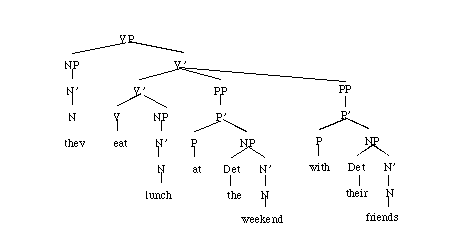Intermediate Syntax
Problems for Friday 26th January
1. "One" in NPs
As discussed in class, one, as used in the construction "I
liked the bicycle with the drop handlebars, but my sister preferred the
one with 24 gears", can substitute for N', but not N.
My own judgements on (1a,b) are as given; together with the fact about
the distribution of "one" given above, they motivate the trees
below.
1. a. * I wanted to eat the piece of pie; my mother wanted to eat the
one of cake.
b. I wanted to meet the admirer of Delius from France; my mother wanted
to meet the one from Glasgow.
[i.e. My mother wanted to meet the admirer of Delius from Glasgow]
A. What are your judgements on the following sentences, and what
structures can you give for the italicised sequences that are consistent
with these judgements? You do not need to give the internal structure of
the relative clauses.
2. a. My sister ate the piece of pie that my father had recommended,
but I ate the one that he didn't like the look of.
b. This teacher of physics is very helpful, but that one of biology
is a bit aloof.
c. Do you want some pie? The piece on the plate looks good, but
the one in the bowl doesn't appeal to me much.
B. It is clear that when you have a constituent that contains
more than a noun head, the whole phrase cannot just have the category N
(since that would imply the whole phrase was just a single word). What
data from one substitution can be used to give an empirical argument
that even when a constituent contains no words other than the head, it
should be assumed to constitute a phrasal category (e.g. to be an N' or
an NP, as well a just an N)?
2.
Download the grammar
tool for adjuncts, using the "save target
as option", and then build structures for the sentences in (2)
and two word order variants of them (giving a total of four structures).
(2) a. They eat five apples before lunch with their friends
for fun.
b. They eat five apples before lunch for fun under the table with their
friends.
NB: When downloading, use "save
target as" option.
3. VPs
At the moment we are assuming that the structure of a sentence is as
below; that is to say, that the entire sentence is a VP; the constituent
containing the verb and its object (if it has one) is a V'
.
A. Recall also that, just as one, substitutes for N' but
not N, so do so substitutes for V' but not V. Using this or other
arguments, how would you analyse the following sentences (again, native
speakers of English, please make yourself available to your classmates
as consultants). You may find that there is disagreement about some judgements,
or that some are clearer than others.
1. a. Beethoven played tennis with Delius.
b. Beethoven played tennis with Delius on Saturdays.
c. Delius relied on his mother.
d. Delius rowed on the Thames.
e. My teacher put his car in the garage.
B. What empirical argument can you give that the tree below is
not the right structure for (2)?

2. They eat lunch at the weekend with their friends.
4. Subcategorization frame and phrase structure rules
Here is a set of simple phrase structure rules for the language Swinglish.
We are still at this point sticking to the assumption that a "sentence"
is in fact a VP
| VP |
|
NP V |
| NP |
|
Det N |
| N |
|
AdjP N |
| N' |
|
N |
| AdjP |
|
Adj |
| V' |
|
PP V |
| V' |
|
NP V |
| V' |
|
PP NP V |
| V' |
|
V |
| PP |
|
NP P |
| V |
|
eat |
| V |
|
send |
| V |
|
play |
| N |
|
boys |
| N |
|
trumpet |
| N |
|
stool |
| N |
|
morning |
| N |
|
girls |
| N |
|
toast |
| Det |
|
the |
| P |
|
to |
| P |
|
in |
| Adj |
|
insufferable |
And here are the subcategorization frames for the verbs "send",
"eat" and "play"
| send (V): |
PP NP ___ |
| eat, play (V): |
NP ___ |
| eat, play (V): |
___ |
A. Which of the following sentences are generated by the combination
of the phrase structure rules and subcategorization frames given above?
1. The insufferable boys the morning in the trumpet play.
2. The girls the trumpet send.
3. The girls eat the insufferable toast.
4. The boys the insufferable girls to the toast send.
5. The trumpets the insufferable girls the toast send.
B. What is the shortest sentence (VP) that this grammar will
generate (in number of words)?
What is the longest sentence (VP) that this grammar will generate (in number
of words)?
C. Suppose that a new word enters the lexicon, borrowed from
English, with the following subcategorization frame:
| contribute (V): |
___ NP PP |
Can the grammar generate a sentence that includes this word?
If so, provide such a sentence.
If not, explain why not.



